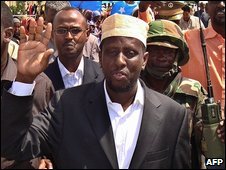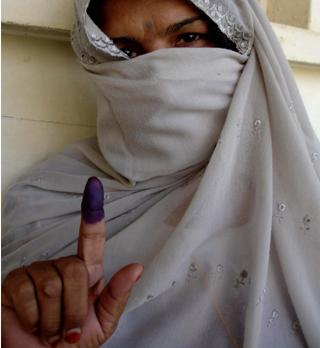America doesn't work that way.
Egypt, President Morsi, and an Uncoup
I heard about Egypt's military prying President Morsi out of office last night. National leaders made the usual 'military coups are bad' statements, while Egypts military leadership said that they'd see to it that free elections happened in the near future.1President Morsi's truncated term in office isn't surprising. Last year he said:
- He's making Egypt
- Safe for freedom and democracy
- Stable
- Nobody can change the new rules
- Except him
Quite a few folks in Egypt were disappointed by Morsi. He'd promised that he and his Muslim Brotherhood would let everybody have a say in how they ran Egypt.
One of the problems with elections and an informed electorate, from an old-school viewpoint, is that 'the Masses' expect leaders to keep their word.
Right now, I think there's a chance what happened in Egypt isn't a coup. Egypt's military may have stepped in to keep Morsi and company from dragging Egypt back to the 'good old days' of elite rule.
Elections and Assumptions
Like I've said before, I like the way America's government is supposed to work. Open elections, accountability, and due process are good ideas: even when I feel frustrated with the lot we've got running this country.I don't, however, think that every country should have a bicameral legislature and use a photocopy of the Constitution. That system works for us, but every country has a unique history and culture.
I hope that Egyptians develop a form of government that works for them: all of them.
Related posts:
- "Egypt, America, and 'Preserving Freedom' "
(December 10, 2012) - "Egypt, Morsi, and Dealing With Change"
(December 4, 2012) - "Egypt, America: Change, Freedom, and Other Threats to the Status Quo"
(November 23, 2012) - "Guinea, Military Rule, and Terrorism: Beware Hasty Judgment"
(December 29, 2008)
- "Egypt army arrests key Muslim Brotherhood figures"
BBC News (July 4, 2013) - "Brotherhood leader arrested, Egypt's Islamists call protests"
Asma Alsharif, Shadia Nasralla, Reuters (July 4, 2013) - "Obama chose his words on Egypt carefully -- for a reason"
Jake Tapper, CNN (July 4, 2013)
1 Excepts from news and views:
"Egypt army arrests key Muslim Brotherhood figures"
BBC News (July 4, 2013)
"Egypt's military has moved against the leadership of the Muslim Brotherhood, a day after deposing President Mohammed Morsi.
"Mr Morsi is in detention, as well as senior figures in the Islamist group of which he is a member. Hundreds more are being sought.
"The top judge of Egypt's constitutional court, Adly Mahmud Mansour, has been sworn in as interim leader.
"He has pledged to hold elections based on 'the genuine people's will'.
"At a news conference, Muslim Brotherhood spokesman Gehad el-Haddad declared 'our full refusal and revoking of the military coup' and demanded Mr Morsi's immediate release, along with the other detainees.
"He declared the Brotherhood's 'full denial of co-operation' with the new regime and said it would take part in all 'peaceful, people-led protest'.
"Meanwhile, Egyptian Foreign Minister Kamel Amr - who resigned from Mr Morsi's government on Monday - said he had assured US Secretary of State John Kerry in a telephone call on Thursday that the overthrow of President Morsi had not been a military coup, but the 'overwhelming will of the people'.
"The upheaval in Egypt comes after days of mass rallies against Mr Morsi and the Brotherhood, who are accused of pursuing an Islamist agenda and failing to tackle Egypt's economic problems...."
"Brotherhood leader arrested, Egypt's Islamists call protests"
Asma Alsharif, Shadia Nasralla, Reuters (July 4, 2013)
"Egyptian security forces arrested the leader of the Muslim Brotherhood on Thursday, security sources said, in a crackdown against the Islamist movement after the army ousted the country's first democratically elected president.
"The dramatic exit of President Mohamed Mursi was greeted with delight by millions of jubilant people on the streets of Cairo and other cities overnight, but there was simmering resentment among Egyptians who opposed military intervention.
"An Islamist coalition led by the Brotherhood called on people across the nation to protest in a "Friday of Rejection" following weekly prayers, an early test of Mursi's ongoing support and how the military will deal with it...."
"Obama chose his words on Egypt carefully -- for a reason"
Jake Tapper, CNN (July 4, 2013)
"President Barack Obama's statement about the Egyptian military's seizure of power is as telling for what he doesn't say as for what he does: he doesn't mention the word 'coup.'
"He doesn't call upon the military to restore power to 'the democratically elected civilian government,' but rather to 'a democratically elected civilian government.'
"In other words, it need not be deposed President Mohamed Morsy's.
"The thinking of the president and administration officials, according to a knowledgeable source, is that while the administration is not explicitly supporting the removal of Morsy from power -- it expressly did not support the move -- it is seeking to push the Egyptian military in a direction...."





